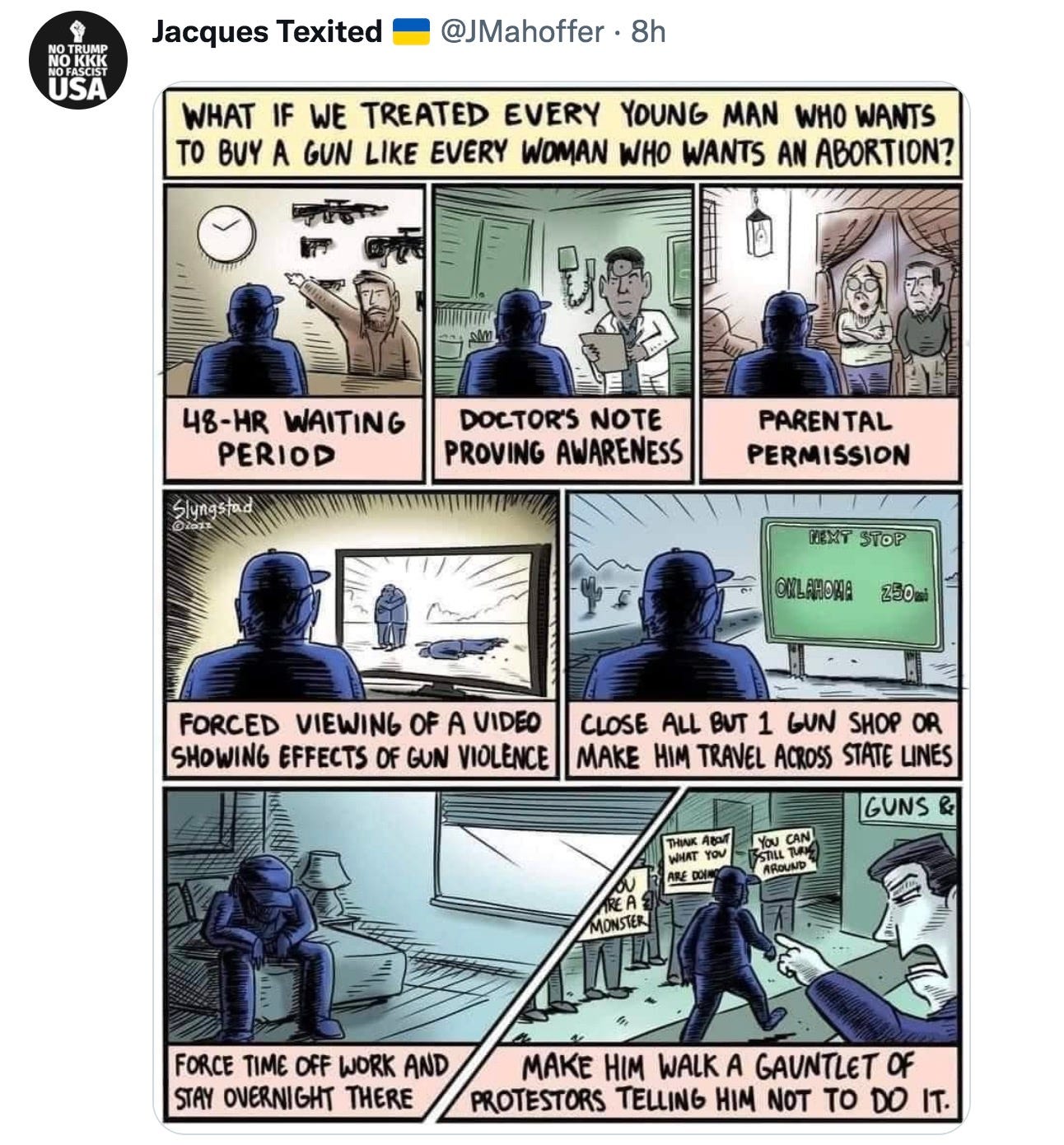Picayune Plus: I have questions about the Brittney Griner case
ALSO: The debut of the visual tweets poll
July 12, 2022
To read this issue in your browser, click on the headline above.
Eric Zorn is a former veteran news columnist for the Chicago Tribune. Find a longer bio and contact information here. This issue exceeds in size the maximum length for a standard email. To read the entire issue in your browser, click on the headline link above.
Index:
Questions about Brittney Griner case
Another "Premium Issue" from the Tribune
The best visual tweets of the week
WNBA star Brittney Griner was arrested on Feb. 17th at an airport outside of Moscow after customs officials, alerted by drug-sniffing dogs, allegedly found vape cartridges containing hashish oil in her hand luggage as she arrived on a flight from New York City.
She has since been imprisoned in Russia and has increasingly become a cause celebre stateside as her trial proceeds.
In May, the U.S. State Department issued a vague statement saying Griner was being “wrongfully detained,” suggesting she is more a hostage than a prisoner, but officials didn’t explain how or why they’d reached that conclusion.
We can start the guessing process by looking at the 2020 law that lists 11 different reasons the U.S. might categorize someone as wrongfully or unlawfully held:
United States officials receive or possess credible information indicating innocence of the detained individual.
The individual is being detained solely or substantially because he or she is a United States national.
The individual is being detained solely or substantially to influence United States Government policy or to secure economic or political concessions from the United States Government.
The detention appears to be because the individual sought to obtain, exercise, defend, or promote freedom of the press, freedom of religion, or the right to peacefully assemble.
The individual is being detained in violation of the laws of the detaining country.
Independent nongovernmental organizations or journalists have raised legitimate questions about the innocence of the detained individual.
The United States mission in the country where the individual is being detained has received credible reports that the detention is a pretext for an illegitimate purpose.
The individual is detained in a country where the Department of State has determined in its annual human rights reports that the judicial system is not independent or impartial, is susceptible to corruption, or is incapable of rendering just verdicts.
The individual is being detained in inhumane conditions.
Due process of law has been sufficiently impaired so as to render the detention arbitrary.
United States diplomatic engagement is likely necessary to secure the release of the detained individual.
Any one of these factors might not be sufficient — the law suggests a look at “the totality of the circumstances.”
Griner is facing a prison sentence of up to 10 years and recently offered the Russian court an admission of guilt, saying that she'd packed her suitcase in haste and inadvertently put the contraband material into it.
I don’t buy her “whoopsie!” story and I suspect the judge won’t either.
Yet I also don’t buy the idea that Griner was engaged in drug trafficking — the amount of hash oil in question was small and clearly intended only for personal use. Further, she makes millions every year playing for a Russian team during the WNBA off season and is almost certainly not selling drugs to supplement her income.
I’m wondering:
1. Is there evidence that, her legal admissions notwithstanding, the seized material was planted and that she's been framed, as some her advocates maintain? Are her friends and teammates saying that vaping hash oil — perhaps mostly as a pain reliever — would have been out of character for her?
2. Is Griner being treated differently from other foreign nationals arrested at the Russian airports with banned drugs in their luggage? In other words, do anecdotes and statistics suggest that Griner has been singled out for unfair, unjust treatment because of her celebrity status and high value as prisoner-swap material?
The coverage I’ve seen — and though I’ve read a lot I certainly haven’t seen it all — hasn’t been particularly illuminating.
If Griner has been framed or if she's being given harsher treatment because of her high profile — or, even worse, because she is Black and openly gay — so that the Russians can use her as leverage in getting some of their own citizens or agents released from U.S. custody, then, yes, obviously, her continued imprisonment is an outrage.
But I can’t help but point out that very similar outrages dealing with far less famous Americans detained overseas under questionable circumstances haven’t raised the ire or concern of Griner’s most vehement advocates.
The arguably outrageous confinement of Griner in Russia is on par with the confinement in the U.S. of those convicted of relatively minor drug offenses — equally if not more sympathetic victims of prosecutorial zeal who aren’t the beneficiaries of public-relations campaigns. For example, a Facebook commenter drew my attention to disabled U.S. Army veteran Sean Worsley, who spent 10 month behind bars in Alabama because he had marijuana in his car as he drove through and law enforcement officials there did not honor his medical marijuana prescription from his home state of Arizona.
Given the facts as we know them and the tense state of relations between the United States and the war criminals in charge in Russia, it’s possible that Griner is both legitimately imprisoned for violating drug laws and a de facto political hostage.
The U.S. will likely give up a fairly high profile and vastly more guilty Russian prisoner to secure her safe return — a form of appeasement that seems likely to encourage more scrutiny of American citizens in Russia, more arrests and more lousy trades.
Notes and comments from readers —lightly edited —- along with my responses
Some of these messages are in reference to items in last Thursday’s Picayune Sentinel.
Phillip S. — I liked reading the extended quotes from your exit interview with Robert Feder upon his departure from the media beat. The style of your interaction was familiar. I interviewed my parents years ago and edited a transcript to make it appear that they were telling a story.
I did the same with both my parents and with my wife — learned something new each time!
Pete P. — Regarding the Talking Heads’ song “Heaven” and your contention that “it requires contrast to experience bliss. “ You’ve never tried a bowl of pure Lucky Charms marshmallow bits.
I have not. And I stand corrected, for without even sampling such a product I can tell it would be sublime beyond words. But regarding the nature of heaven, “The Twilight Zone” episode “A Nice Place to Visit” strikes some of the same themes about the suffocating tedium of perfection. A crook dies and finds himself in a glorious afterlife in which gorgeous women satisfy his every whim and he wins every time he gambles. At first he wonders how it was that he earned his way into such an eternal paradise, but by the end of the episode he realizes that, well, you know …
Jay G. — How long does it usually take for the winning Tweet of the Week to settle into its winning position? It seems to me that the leader "out of the gate" (during the first hour? minutes?) hangs on to win almost every time. Rarely, it seems, is there a neck-and-neck battle during the week for one to edge out another.
Your observation matches mine. In the seven years I've been running this contest I've found it's rare for the vote to change much after the first few hours. You see the same thing in opinion polling and even in voting.
Roberta M. — I do not vote for mean-spirited tweets — the ones about cheating your kids, lying to your spouse, stealing from your friends, etc. You occasionally include those and I wish you would self-censor. It may be hard to find humor if you avoid the mean-spirited, but you personally are never mean-spirited and you're a witty guy.
The only conscious censoring I do is my effort to keep the entries relatively clean. I do allow a touch of profanity and vulgarity from time to time, particularly when the curse words provide a nice comic punch. This isn’t a family newsletter by any means, but I do try to steer clear of the gratuitously coarse as well as the needlessly cruel.
Dan D. — I now pay about $1000 annually for my Tribune home delivery and digital subscription. Many people have said that if I call and ask for a lower rate they will give me a lower price for a while, but I abhor this sort of game playing. In the end, I know they want me to pay as much as possible for the digital subscription and accelerate the demise of home delivery. After 45 years of being a home subscriber, I want to feel that paper in the morning when drinking my coffee. Any advice?
Play the game. I wish newspapers would charge a fair, transparent and sustainable price and not make customers feel like marks for scam artists, but that’s not the world we live in (see the item below on the “Premium Issue” flim-flam). Put it on your to-do list to call customer service (312-546-7900) every four months or so and ask for a better deal or else.
I doubt publishers are hoping for the demise of the printed product — it commands far better advertising rates last I looked. If anything they are looking to delay as long as possible the day when print dies.
But don’t give up on the Tribune or daily newspapers in general. They remain utterly vital, and the men and women doing the work aren’t responsible for the practices of their colleagues in circulation.
Marc M. — I’m optimistic about the country, the polity, and the structure and durability of the nation. None of the current political issues is beyond the reach of our existing political processes. No political minority is capable of blocking the desires of the majority for any length of time. Our history is one of continuous, occasionally halting, progress in our striving for freedom, equality, opportunity and prosperity.
We are not in the ‘end times’ of American politics or democracy. Proclaiming the ‘end times’ encourages political violence.
People in a position to influence public opinion and motivate action should promote and encourage use of the many tools that are available to us within our very successful political institutions as the most effective way to achieve improvement and preservation of our very successful society. They should also stop undermining confidence in our institutions, stop espousing anti-democratic quick fixes and work arounds, and stop undermining the value of individual votes by telling people the system is rigged against them.
I share your hopes but not your confidence. I’m sure every great nation, every great system, every strong empire has assured itself prior to collapse and ruin that it is structurally sound and built to last millenia.
The design element in our republic that protects the rights and prerogatives of minority factions and small states has the unintended but perhaps inevitable consequence of cementing a kind of minority rule that will endure and frustrate our population, particularly when a Supreme Court with lifetime appointments has given the OK for deeply partisan gerrymandering. Nothing aside from an impossible-to-pass constitutional amendment will level the power in the U.S. Senate between Wyoming (one senator per 290,000 people) and California ( one senator per 19.8 million people).
And we are seeing 50 years of history unraveling when it comes to women’s reproductive rights. How long will majority factions quietly take the insult of policy decisions forced on them by a minority? And how will this (disproportionately well armed) minority respond when its power is justly taken from them? We already got a taste on January 6, 2021. Those goons would have killed Mike Pence, Nancy Pelosi, AOC and others if they’d had the opportunity.
Behold, Tribune subscribers, your $8 (or maybe free) “premium issue”
The Sunday Tribune this week contained a 47-page special puzzle insert featuring jumbles, crosswords, WordWheels, Sudoku, Kakuro, mazes, word searches and other diversions. A nice bonus? Yes, for those of us who know to call Tribune customer service at least once every six months and ask to opt out of paying for these so-called “premium issues.”
Those who don’t opt out and who get the Sunday paper delivered pay $7.99 extra each month — 40% more than I pay for daily digital access plus Sunday home delivery — for these “premium issues.”
The August “premium issue” will be “Life Skills,” according to a customer service representative. The supplement will focus on “healing with an emphasis on mental well being.” September’s insert will be the NFL season preview. October’s will be a holiday entertainment guide. November’s will be a holiday gift guide.
"For each Premium Issue, your account balance will be charged an additional fee up to $7.99 in the billing period when the section publishes,” says the postcard from the Tribune. “The charge will shorten (your) pay-through date.”
The postcard does not explain the opt-out option and you cannot find out the amount you are paying for your subscription/access by checking your account on the web.
I’ve written about this before and will continue to mention it as a reminder to those subscribers who want to opt out that they need to call 312-546-7900 at least twice a year to avoid the extra charges.
Why doesn’t the Tribune allow subscribers to opt out permanently? Anyone want to guess?
The paper continues to do very good reporting in tough times for local journalism — Michael Hawthorne’s stunning and infuriating investigative report on Sunday, “More than 8 million Illinoisans get drinking water from a utility where forever chemicals have been detected,” was worth more than a year’s worth of “premium issues” all on its own. I’m happy to pay to support such work. But holiday entertainment guides? Not so much.
Ya gotta see these tweets!
I often run across tweets that rely on visual humor and so can’t be included in the Tweet of the Week contest (the template for the poll does not allow the use of images). Here are a few good ones I’ve come across recently:
More than three-quarters of paying subscribers in a click poll last week said they’d like the chance to vote for a winning visual tweet. I will share that winner in the main edition Thursday in a shameless effort to recruit more paying subscribers. The template here allows you to vote only for your favorite, so choose wisely:
Meanwhile, on the conventional-tweet front, here’s an oldie but goodie:

There’s still time to vote in the conventional Tweet of the Week poll!
Thank you for supporting the Picayune Sentinel. To help this publication grow, please consider spreading the word to friends, family, associates, neighbors and agreeable strangers.

















Regarding your exchange with Marc on optimism v. pessimism, I'm reminded of something I heard on a podcast, don't remember which one, something to the effect of (to use Cassidy Hutchinson's favorite phrase), it's easier for liberals to contemplate radical structural change on the one hand or total collapse of democracy on the other than to imagine a Democrat winning a Senate race in Indiana. The solution to most of your problems is for the good guys to broaden their appeal. This isn't actually a bad outcome, democracy-wise. That's what has always been necessary to get big stuff through. Your worries are less worrisome when that happens. The Senate's malapportionment is an outrage, a vestige of EU-ish federalism that not even Madison wanted then, a necessary compromise, but, as you say, it won't ever be fixed, so time to let that one go. And, indeed, it wasn't so much of a problem before the Big Sort, which gave all those extra votes to tiny red states. Small states always got extra federal largesse, but it didn't create a partisan advantage until relatively recently. Democrats need to transcend the Big Sort. That needs to be their main mission at this point.
Overruling Roe is bad, I agree, but even that fits into Marc's overall-progress-amid-setbacks model. Before Roe, abortion was widely outlawed in this country, in most cases I think without exception. Roe overturned the abortion laws of nearly every state. We will now backslide, but not to the pre-Roe nightmare. Abortion will remain widely available in the U.S., including in pill form. I don't want to minimize the problems, but neither do I want to exaggerate them. The Supreme Court is in conservative hands now. So they're going to get their way on some important things for a while, just as liberals got theirs on lots and lots. And some of those conservative positions aren't even obviously nuts. It's not the end of the world, and, even with this 6-3 majority, you won't see Thomas and those of his more radical ilk get their frightful druthers.
Re gerrymandering, I think Democrats should make it a signature cause to outlaw partisan gerrymandering nationally once and for all. It's a popular position, one that most Democrats share and most Republicans oppose, and few know it. In the meantime, they need to change the laws or state constitutional requirements -- via referendum or whatever -- in Maryland and New York that turned this latest district-drawing from a Democratic victory to a Republican one (albeit not quite as bad as before). Be clear: we stand ready to end partisan gerrymandering and are eager to do it, but so long as you Republicans insist on picking your voters rather than letting them pick you in red states, we're sure as shit going to do the same thing in blue states to the maximum extent possible.
Our regime, in the political science sense of "system of government," has proved remarkably durable. It's among the oldest on the planet. Its imminent demise, amid far more dire and challenging circumstances than we face today, has been predicted at many points throughout history. I look at our current situation as akin to a bear market -- we're backsliding a bit democratically and in other ways as well. But bear markets eventually turn into bull markets and the long view reveals overall gains and counsels patience and holding on to your stock.
Many people do not appear to understand the risk that they are taking when they travel or do business in authoritarian countries. Particularly countries that have laws that are specifically prejudicial to people like themselves. Similarly, there is a long history of Americans thinking that they can get away with 'bending the rules' because they fail to understand the difference between the US and other legal systems. There are at least two other Americans that are currently held in Russia, one since 2017. Whether a trade is made is generally a political issue.